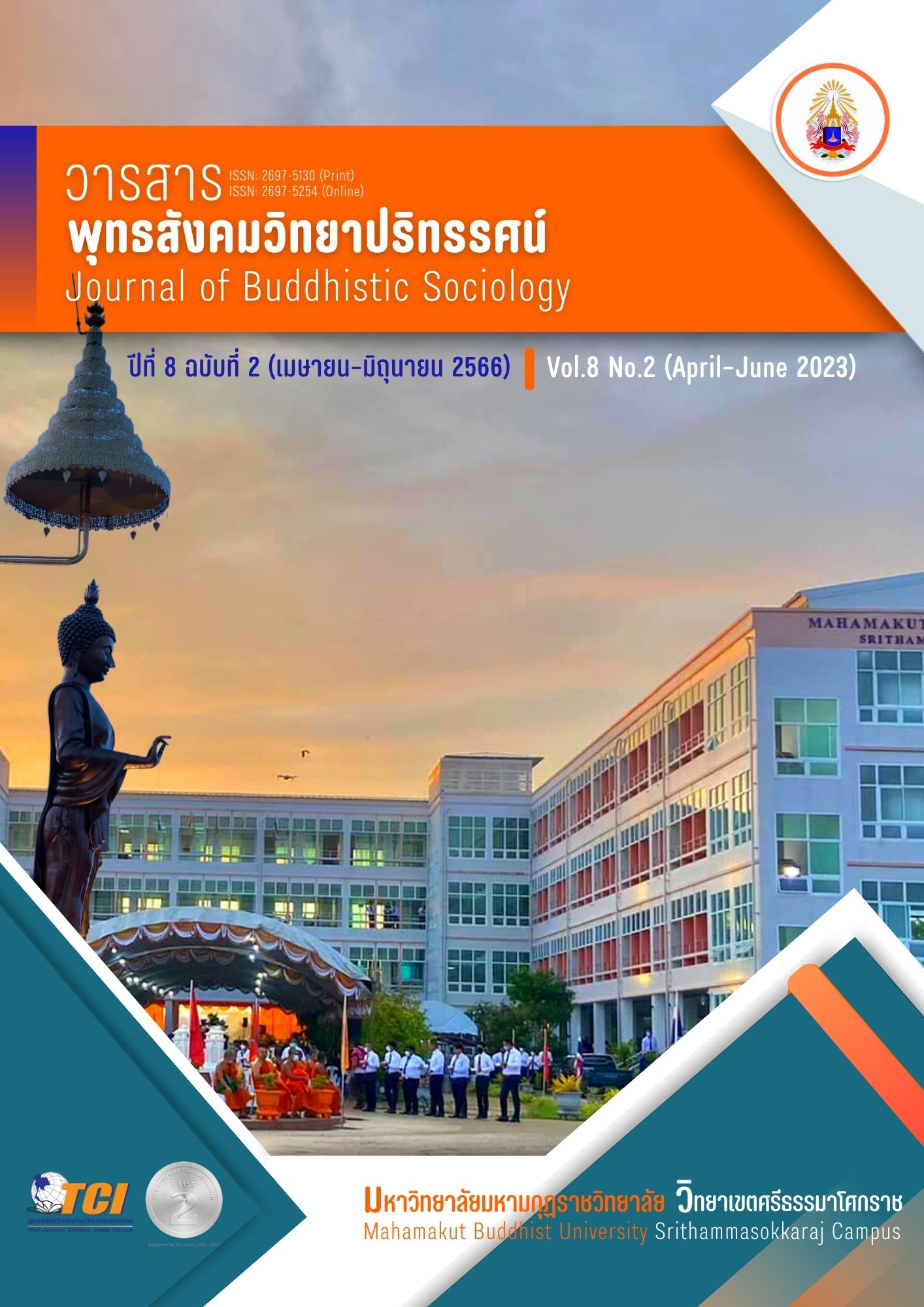การใช้หลักทิฏฐธัมมิกัตถประโยชน์ในการดำเนินชีวิตของนักเรียน ระดับมัธยมศึกษาตอนปลาย โรงเรียนพรุพีพิทยาคม อำเภอบ้านนาสาร จังหวัดสุราษฎร์ธานี
Main Article Content
บทคัดย่อ
สารนิพนธ์นี้มีวัตถุประสงค์ดังนี้ 1) เพื่อศึกษาการใช้หลักทิฏฐธัมมิกัตถประโยชน์ในการดำเนินชีวิตของนักเรียนระดับมัธยมศึกษาตอนปลาย โรงเรียนพรุพีพิทยาคม อำเภอบ้านนาสาร จังหวัดสุราษฎร์ธานี และ 2) เพื่อศึกษาข้อเสนอแนะการส่งเสริมการใช้หลักทิฏฐธัมมิกัตถประโยชน์ในการดำเนินชีวิตของนักเรียนระดับมัธยมศึกษาตอนปลาย โรงเรียนพรุพีพิทยาคม อำเภอบ้านนาสาร จังหวัดสุราษฎร์ธานี เป็นการวิจัยแบบผสมผสาน (Mixed Methods Research) สำหรับการวิจัยเชิงปริมาณ เก็บรวบรวมข้อมูลจากนักเรียนระดับมัธยมศึกษาตอนปลาย โรงเรียนพรุพีพิทยาคม ทั้งหมด จำนวน 231 คน วิเคราะห์ข้อมูลด้วยคอมพิวเตอร์ โดยใช้โปรแกรมสำเร็จรูป สถิติที่ใช้ ได้แก่ ค่าความถี่ ค่าร้อยละ ค่าเฉลี่ย และส่วนเบี่ยงเบนมาตรฐาน ส่วนการวิจัยเชิงคุณภาพ เก็บรวบรวมข้อมูลด้วยแบบสัมภาษณ์เชิงลึกแบบมีโครงสร้าง จากผู้ให้ข้อมูลสำคัญจำนวน 5 คนได้มาจากการเลือกแบบเจาะจง วิเคราะห์คำให้สัมภาษณ์ของผู้ให้ข้อมูลสำคัญตามวัตถุประสงค์การวิจัย โดยใช้เทคนิคการวิเคราะห์เนื้อหาประกอบบริบท
ผลการวิจัยพบว่า
1. การใช้หลักทิฏฐธัมมิกัตถประโยชน์ในการดำเนินชีวิตของนักเรียนระดับมัธยมศึกษาตอนปลาย โรงเรียนพรุพีพิทยาคม อำเภอบ้านนาสาร จังหวัดสุราษฎร์ธานี ภาพรวมอยู่ในระดับมาก เมื่อพิจารณาเป็นรายด้าน พบว่าอยู่ในระดับมากทุกด้าน โดยด้านที่มีค่าเฉลี่ยสูงสุด ได้แก่ ด้านกัลยาณมิตตตา (คบคนดีเป็นมิตร) รองลงมา คือ ด้านอารักขสัมปทา (พร้อมด้วยการรักษา) และด้านที่มีค่าเฉลี่ยต่ำสุด คือ ด้านสมชีวิตา (เลี้ยงชีวิตแต่พอดี)
2. ข้อเสนอแนะการส่งเสริมการใช้หลักทิฏฐธัมมิกัตถประโยชน์ในการดำเนินชีวิตของนักเรียนระดับมัธยมศึกษาตอนปลายโรงเรียนพรุพีพิทยาคม อำเภอบ้านนาสาร จังหวัดสุราษฎร์ธานี พบว่า ควรนำหลักทิฏฐธัมมิกัตถประโยชน์มาสอดแทรกในกิจกรรมการเรียนการสอนเพื่อเป็นการปลูกฝังจิตสำนึก อันเป็นรากฐานสำคัญในการสร้างเนื้อสร้างตัว สร้างฐานะที่มั่นคงของนักเรียนต่อไป
Article Details

อนุญาตภายใต้เงื่อนไข Creative Commons Attribution-NonCommercial-NoDerivatives 4.0 International License.
เอกสารอ้างอิง
กัลณี ด่านทองหลาง. (2560). ผลกระทบของระบบการควบคุมภายในต่อผลการดำเนินงานขององค์กรปกครองส่วนท้องถิ่น ในจังหวัดนครราชสีมา. ใน การศึกษาค้นคว้าอิสระของหลักสูตรบัญชีมหาบัณฑิต. มหาวิทยาลัยเทคโนโลยีราชมงคลอีสาน.
ชนิดา กลัวผิด และคณะ. (2558). การรับรู้และพฤติกรรมของนักเรียนศึกษามหาวิทยาลัยราชภัฏนคร ปฐมที่มีต่อการนำหลักธรรมมาดำเนินชีวิต. ใน รายงานวิจัย. นครปฐม: มหาวิทยาลัยราชภัฏนครปฐม.
พรรตนฤน เพชรวิวรรธน์. (2545). การศึกษาการปลูกฝังคุณธรรมให้แก่นักเรียนประถมศึกษาในกรุงเทพมหานคร. ใน วิทยานิพนธ์ศึกษาศาสตรมหาบัณฑิต. จุฬาลงกรณ์มหาวิทยาลัย.
พระครูปลัดสิวริศร์ สุทฺธิมโน (ด่านประสิทธิ์). (2563). การประยุกต์ใช้หลักทิฏฐธัมมิกัตถประโยชน์เพื่อการดำเนินชีวิตของมนุษย์ในสังคมบริโภคนิยม. วารสารมหาจุฬานาครทรรศน์, 7(4), 144-155.
พระครูโพธิธรรมานุกูล (บรรเทา ชุดจีน). (2554). ศึกษาแนวทางการนำหลักทิฏฐธัมมิกัตถประโยชน์เพื่อแก้ปัญหาชีวิตของพุทธศาสนิกชนในสังคมไทยปัจจุบัน. ใน วิทยานิพนธ์พุทธศาสตรมหาบัณฑิต. มหาวิทยาลัยมหาจุฬาลงกรณราชวิทยาลัย.
โรงเรียนศรีธรรมราชศึกษา. (2553). รายงานผลการประเมินตนเองของสถานศึกษาระดับมัธยมศึกษา ปีการศึกษา 2553. นครศรีธรรมราช: โรงเรียนศรีธรรมราชศึกษา.
ศิริวรรณ เสรีรัตน์ และคณะ. (2541). วารสารการบริหารการตลาดยุคใหม่. กรุงเทพมหานคร: โรงพิมพ์บริษัทธีระฟิล์ม และไซเท็กซ์ จำกัด.
สำนักงานคณะกรรมการการศึกษาขั้นพื้นฐาน. (2545). ระบบประเมินคุณภาพและมาตรฐานการศึกษาแห่งชาติ. กรุงเทพมหานคร: คุรุสภาลาดพร้าว.
สุกัญญา สร้อยฟ้า. (2556). การศึกษาพฤติกรรมการนำหลักทิฎฐธัมมิกัตถประโยชน์ไปใช้ในการดำเนินชีวิตประจำวันของประชาชนในเขตเทศบาลตำบลนาเยีย อำเภอนาเยีย จังหวัดอุบลราชธานี. ใน พุทธศาสตรมหาบัณฑิต. มหาวิทยาลัยมหาจุฬาลงกรณราชวิทยาลัย.


